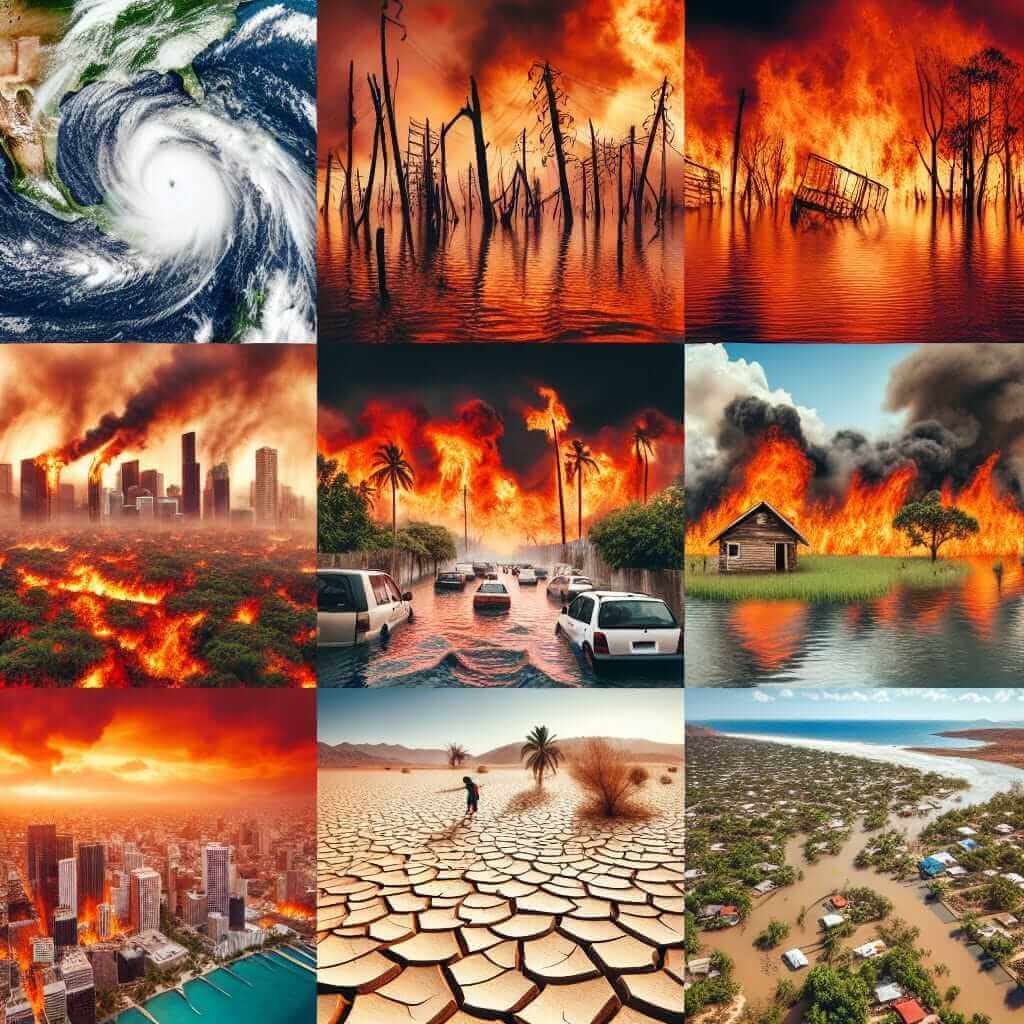“The impact of climate change on natural disasters” is a hot-button issue in today’s world, and it’s a topic that frequently appears in IELTS Writing Task 2. Understanding this complex relationship is crucial not just for your IELTS exam, but also for grasping the environmental challenges our planet faces.
This article will provide potential IELTS writing prompts on this theme, guide you through dissecting a chosen prompt, and offer a model essay illustrating how to craft a band-8 worthy response.
Here are some potential IELTS essay prompts on this topic:
- To what extent do you agree or disagree that climate change is the primary contributor to the increasing frequency and severity of natural disasters?
- Discuss the impact of climate change on the occurrence of natural disasters. Provide specific examples to support your answer.
- Some people argue that focusing on adapting to the effects of climate change is more important than trying to prevent it. To what extent do you agree or disagree?
Model Essay: Climate Change and Natural Disasters
Let’s analyze the first prompt:
To what extent do you agree or disagree that climate change is the primary contributor to the increasing frequency and severity of natural disasters?
Analysis of the Prompt
- Type: Opinion essay (agree/disagree)
- Keywords: climate change, natural disasters, frequency, severity, primary contributor
- Task: You need to present a clear stance on whether climate change is the MAIN reason for the escalating intensity and occurrence of natural disasters.
Model Essay
Climate change is undeniably one of the most pressing issues facing humanity today. While its long-term consequences are multifaceted, its impact on the frequency and intensity of natural disasters is particularly alarming. I completely agree that climate change is the primary driver behind this escalating trend.
Firstly, a warmer planet, due to greenhouse gas emissions, leads to higher ocean temperatures. This, in turn, fuels more powerful hurricanes and cyclones. The increased heat also exacerbates droughts in certain regions, creating ideal conditions for wildfires to ignite and spread more rapidly. Recent years have provided ample evidence of this, with record-breaking wildfires ravaging Australia and California, while hurricanes like Harvey and Maria have left unprecedented devastation in their wake.
Secondly, rising sea levels, another direct consequence of climate change, significantly increase the risk of coastal flooding. As glaciers and ice sheets melt at an alarming rate, the added water in the oceans leads to higher sea levels, putting coastal communities at greater risk from storm surges and flooding, even with relatively minor storms. This is particularly concerning for low-lying island nations, where entire communities face the threat of displacement.

However, it is important to acknowledge that natural climate variability also plays a role in the occurrence of extreme weather events. Factors such as El Niño and La Niña can influence weather patterns globally, contributing to droughts, floods, and other natural disasters. Nevertheless, the overwhelming scientific consensus is that climate change is acting as a threat multiplier, intensifying the impacts of these natural phenomena.
In conclusion, while natural climate variability undeniably contributes to the occurrence of natural disasters, the increasing frequency and severity of these events can be primarily attributed to the undeniable impact of human-induced climate change. Addressing this global crisis through concerted international action is not just an environmental imperative, but also a matter of safeguarding human lives and livelihoods. (Word count: 298)
Writing Tips
- Clear stance: State your position clearly in the introduction.
- Strong evidence: Support your points with relevant and specific examples of how climate change impacts different types of natural disasters.
- Acknowledge counter-arguments: Briefly address opposing viewpoints to demonstrate a balanced perspective.
- Academic language: Use formal vocabulary and complex sentence structures appropriately.
Key Vocabulary
- Exacerbate (verb) /ɪɡˈzæs.ə.beɪt/: to make a problem, bad situation, or negative feeling worse
- Unprecedented (adjective) /ʌnˈpres.ɪ.den.tɪd/: never done or known before
- Ravaging (verb) /ˈræv.ɪ.dʒ.ɪŋ/: causing great destruction or damage
- Displacement (noun) /dɪˈspleɪs.mənt/: the situation in which people are forced to leave their homes, especially because of a natural disaster or war
- Threat multiplier (noun) /θrɛt ˈmʌltɪˌplaɪər/: something that worsens an already dangerous situation
Conclusion
This article has provided insights into how to effectively approach an IELTS Writing Task 2 essay on the impact of climate change on natural disasters. Remember to practice writing essays on similar topics to improve your skills. Some other related themes you might encounter include:
- The role of governments in mitigating climate change.
- The effectiveness of international agreements on climate change.
- The economic impact of climate change and natural disasters.